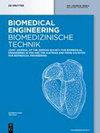Embedded system design for classification of COPD and pneumonia patients by lung sound analysis
IF 1.8
4区 医学
Q4 ENGINEERING, BIOMEDICAL
引用次数: 2
Abstract
Abstract Chronic obstructive pulmonary disease (COPD) and pneumonia are lethal pulmonary illnesses with equivocal nature of abnormal pulmonic acoustics. Using lung sound signals, the classification of pulmonary abnormalities is a difficult task. A standalone system was conceived for screening COPD and Pneumonia patients through signal processing and machine learning methodologies. The proposed system will assist practitioners and pulmonologists in the accurate classification of disease. In this research work, ICBHI’s and self-collected lung sound (LS) databases are used to investigate COPD and pneumonia patient. In this scheme, empirical mode decomposition (EMD), discrete wavelet transform (DWT), and analysis of variance (ANOVA) techniques are employed for segmentation, noise elimination, and feature selection, respectively. To overcome the inherent limitation of ICBHI’s LS database, the adaptive synthetic (ADASYN) sampling technique is used to eradicate class imbalance. Lung sound features are used to train fine Gaussian support vector machine (FG-SVM) for classification of COPD, pneumonia, and heathy healthy subjects. This machine learning scheme is implemented on low cost and portable Raspberry pi 3 model B+ (Cortex-A53 (ARMv8) 64-bit SoC @ 1.4 GHz through hardware-supported language. Resultant hardware is capable of screening COPD and pneumonia patients accurately and assist health professionals.基于肺声分析的COPD和肺炎患者分类嵌入式系统设计
慢性阻塞性肺疾病(COPD)和肺炎是肺声学异常性质不明的致死性肺部疾病。利用肺声信号对肺异常进行分类是一项困难的任务。通过信号处理和机器学习方法,设计了一个独立的系统,用于筛查COPD和肺炎患者。提出的系统将有助于从业者和肺科医生在疾病的准确分类。本研究采用ICBHI和自行收集的肺声(LS)数据库对COPD和肺炎患者进行调查。在该方案中,分别采用经验模态分解(EMD)、离散小波变换(DWT)和方差分析(ANOVA)技术进行分割、去噪和特征选择。为了克服ICBHI LS数据库的固有局限性,采用自适应合成(ADASYN)采样技术消除类不平衡。利用肺声特征训练精细高斯支持向量机(FG-SVM)对COPD、肺炎和健康受试者进行分类。该机器学习方案通过硬件支持的语言在低成本便携式树莓派3 B+ (Cortex-A53 (ARMv8) 64位SoC @ 1.4 GHz上实现。由此产生的硬件能够准确筛查COPD和肺炎患者并协助卫生专业人员。
本文章由计算机程序翻译,如有差异,请以英文原文为准。
求助全文
约1分钟内获得全文
求助全文
来源期刊
CiteScore
3.50
自引率
5.90%
发文量
58
审稿时长
2-3 weeks
期刊介绍:
Biomedical Engineering / Biomedizinische Technik (BMT) is a high-quality forum for the exchange of knowledge in the fields of biomedical engineering, medical information technology and biotechnology/bioengineering. As an established journal with a tradition of more than 60 years, BMT addresses engineers, natural scientists, and clinicians working in research, industry, or clinical practice.

 求助内容:
求助内容: 应助结果提醒方式:
应助结果提醒方式:


